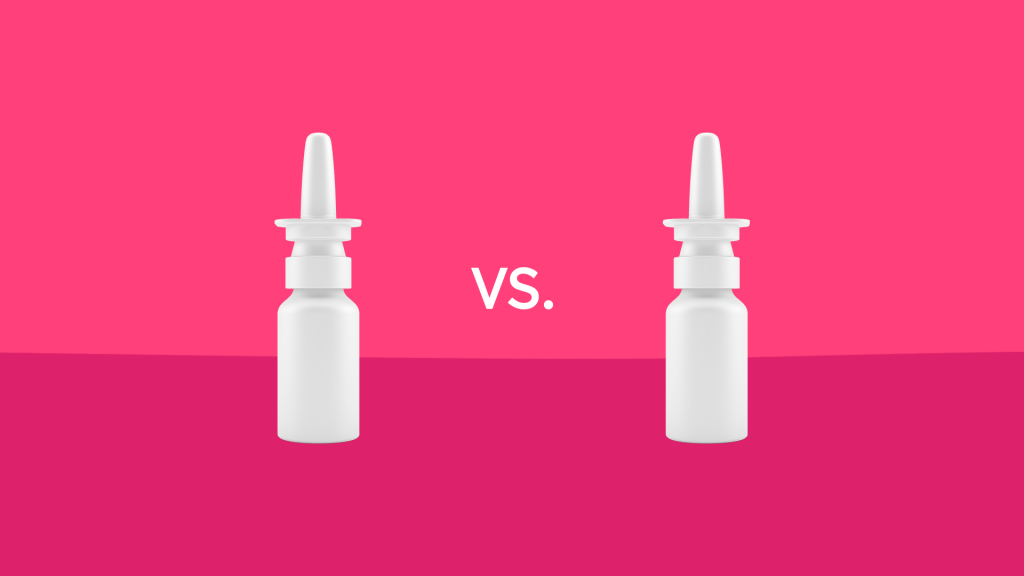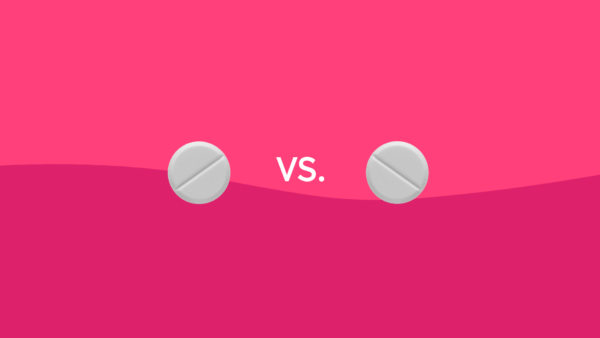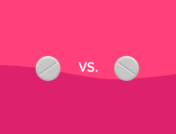Rhinocort and Flonase are steroid nasal sprays used for allergy relief. Both sprays are used to treat allergy symptoms, such as nasal congestion, sneezing, and runny nose. Whether you experience allergy symptoms occasionally or year-round, a nasal spray like Rhinocort or Flonase could be a good option.
Although Rhinocort and Flonase are used for similar purposes, they differ in several ways. Continue reading to learn about the similarities and differences between Rhinocort and Flonase, including their active ingredients, efficacy, and side effects.
What are the main differences between Rhinocort and Flonase?
Rhinocort and Flonase are brand names for prescription and over-the-counter (OTC) nasal sprays. These nasal sprays contain different corticosteroids; Rhinocort contains budesonide, while Flonase contains fluticasone.
Rhinocort is available as a nasal spray bottle that delivers 32 mcg of budesonide per spray. The usual dosage is one to two sprays into each nostril depending on the individual’s age. Rhinocort is not recommended in children under the age of 6.
Flonase is available as a nasal spray bottle that delivers 50 mcg of fluticasone propionate per spray. The usual dosage is one to two sprays into each nostril depending on the individual’s age. Flonase is not recommended in children under the age of 4.
Flonase also comes as a spray bottle that delivers a gentle mist of fluticasone furoate, and it is approved for children aged 2 years and older.
| Rhinocort | Flonase | |
| Drug class | Nasal corticosteroid | Nasal corticosteroid |
| Brand/generic status | Brand and generic version available | Brand and generic version available |
| What is the generic name? | Budesonide | Fluticasone |
| What form(s) does the drug come in? | Nasal spray | Nasal spray |
| What is the standard dosage? | Initial dosage of 2 sprays in each nostril daily. Then, after symptoms have improved, 1 spray in each nostril once daily to control symptoms.
*Dosage varies in children |
Initial dosage of 2 sprays in each nostril daily. Then, after 1 week, 1 to 2 sprays in each nostril once daily to control symptoms
*Dosage varies in children |
| How long is the typical treatment? | Short-term or long-term use as directed by healthcare provider
*consult with a healthcare provider if your child needs treatment for more than 2 months per year |
Short-term or long-term use as directed by healthcare provider
*consult with a healthcare provider if your child needs treatment for more than 2 months per year |
| Who typically uses the medication? | Adults and children 6 years and older | Adults and children 4 years and older |
Conditions treated by Rhinocort and Flonase
Rhinocort and Flonase are approved by the FDA to treat symptoms of allergic rhinitis, also known as hay fever. They can be used to treat perennial (year-round) and seasonal allergy symptoms, including a runny, itchy nose and sneezing.
Flonase is also approved to treat nonallergic rhinitis, or rhinitis that is not caused by exposure to allergens. Both Rhinocort and Flonase may be used off-label to treat or prevent nasal polyps.
It is important to note that these medications are not used to treat an allergic reaction on the skin. They should also not be confused with the inhaler forms of their active ingredients, which are used to treat asthma.
| Condition | Rhinocort | Flonase |
| Allergic rhinitis | Yes | Yes |
| Nonallergic rhinitis | Off-label | Yes |
| Nasal polyps | Off-label | Off-label |
Is Rhinocort or Flonase more effective?
Rhinocort and Flonase are both effective allergy medications. However, it can take at least one week or longer for these medications to start providing maximum relief. It’s important to consult a healthcare provider to determine the best treatment option.
There are limited recent studies that compare the effectiveness of Rhinocort and Flonase. One study conducted in 2021 compared the effectiveness of Rhinocort and Flonase in 62 patients with allergic rhinitis. One group of patients used two sprays of Flonase into each nostril once daily or one spray of Rhinocort into each nostril twice daily. Both drugs were found to improve allergy symptoms, but Flonase was found to improve eye and nasal symptoms better than Rhinocort.
Other allergy medications are available, including antihistamines like Claritin (loratadine) and Zyrtec (cetirizine). These medications may also be combined with other drugs like decongestants. Other intranasal corticosteroids are also available, such as Nasonex (mometasone) and Nasacort (triamcinolone).
Coverage and cost comparison of Rhinocort vs. Flonase
Medicare and private insurance plans do not generally cover Rhinocort or Flonase because they’re accessible over the counter. If a healthcare provider prescribes the nasal spray, some insurance plans may help cover it. Rhinocort or Flonase can be prescribed as a generic drug, which insurance plans may cover.
A SingleCare discount card or coupon may help lower the retail price of allergy sprays like Rhinocort and Flonase. With SingleCare, you may be able to save up to 80% on brand and generic drugs at participating pharmacies.
| Rhinocort | Flonase | |
| Typically covered by insurance? | No | No |
| Typically covered by Medicare Part D? | No | No |
| Quantity | 1 bottle or unit | 1 bottle or unit |
| Typical Medicare copay | N/A | $0–$20 |
| SingleCare cost | N/A | $6–$19 |
Common side effects of Rhinocort vs. Flonase
In general, the side effects of steroid nasal sprays like Rhinocort and Flonase are mild and temporary. The most common side effects of Rhinocort and Flonase include nosebleeds, sore throat, cough, and irritation in the sinuses or nasal passages. In addition, Flonase can also cause headaches and nausea or vomiting.
Serious side effects may include infections, impaired wound healing, and severe nosebleeds or septal perforations. Hypersensitivity or allergic reactions are also possible while using a steroid nasal spray. Seek immediate medical attention if you experience rash, hives, itching, swelling of the face or throat, or trouble breathing after using a nasal spray.
Other side effects are possible while using Rhinocort or Flonase. Consult a healthcare provider for more information.
| Rhinocort | Flonase | |||
| Side Effect | Applicable? | Frequency | Applicable? | Frequency |
| Headache | No | – | Yes | 7%-16% |
| Nosebleed | Yes | 5% | Yes | 6%-7% |
| Sore throat | Yes | 3% | Yes | 6%-8% |
| Cough | Yes | <1% | Yes | 4% |
| Nasal irritation | Yes | <1% | Yes | 2%-3% |
| Nausea/Vomiting | No | – | Yes | 3%-5% |
This may not be a complete list of adverse effects that can occur. Please refer to your doctor or healthcare provider to learn more.
Source: DailyMed (Rhinocort), DailyMed (Flonase)
Drug interactions of Rhinocort vs. Flonase
Rhinocort and Flonase may interact with other drugs. In particular, these medications can interact with drugs that can block certain liver enzymes (CYP3A4). Using Rhinocort or Flonase while taking these drugs may lead to increased levels of corticosteroids in the body, which may lead to increased side effects.
Strong CYP3A4 inhibitors include certain antifungals, such as ketoconazole and itraconazole, some antivirals, such as ritonavir and atazanavir, and certain antibiotics, such as clarithromycin and erythromycin. Consult a healthcare provider with a list of your medications before using Rhinocort or Flonase.
| Drug | Drug Class | Rhinocort | Flonase |
| Ketoconazole
Itraconazole |
Antifungals | Yes | Yes |
| Ritonavir
Atazanavir Indinavir Nelfinavir Saquinavir |
Antivirals | Yes | Yes |
| Clarithromycin
Erythromycin |
Antibiotics | Yes | Yes |
Consult a healthcare professional for other possible drug interactions
Warnings of Rhinocort and Flonase
The use of steroid nasal sprays like Rhinocort and Flonase can lead to an increased risk of a fungal infection (Candida albicans) in the throat or nasal passages. Signs of a fungal infection should be monitored if steroid nasal sprays are being used long-term.
Steroids can suppress the immune system, especially with long-term use, which may lead to slowed wound healing and an increased risk of infections.
Steroid nasal sprays may cause glaucoma or cataracts. Consult a healthcare provider if you experience changes in vision while using Rhinocort or Flonase. Tell your healthcare provider if you have eye conditions before using a steroid nasal spray.
The use of steroids can lead to adrenal suppression. Discontinuing steroids may lead to withdrawal symptoms, such as muscle pain or depression. Consult a healthcare provider when discontinuing the use of steroids after long-term use.
In children, steroids can lead to growth suppression in children and adolescents. Caution is advised when using steroid nasal sprays long-term in children and adolescents. Consult a healthcare provider if your child needs to use a steroid nasal spray for more than two months per year.
Contact a healthcare provider before using Rhinocort or Flonase while pregnant or breastfeeding. Your healthcare provider can help you weigh the benefits and risks of using a steroid nasal spray while pregnant.
Frequently asked questions about Rhinocort vs. Flonase
What is Rhinocort?
Rhinocort is a nasal spray that contains the corticosteroid budesonide. Rhinocort is approved to treat symptoms of perennial or seasonal allergic rhinitis in adults and children over the age of 6. It is a brand-name medication that can be found over the counter. Generic alternatives are available with a prescription or over the counter.
What is Flonase?
Flonase nasal spray contains the corticosteroid fluticasone. It is approved to treat nonallergic and seasonal or perennial allergic rhinitis in adults and children over the age of 4. Flonase is available as a brand and generic drug with a prescription or over-the-counter.
Are Rhinocort and Flonase the same?
Rhinocort and Flonase are steroid nasal sprays that can treat nasal allergy symptoms, such as nasal congestion, sneezing, and runny nose. However, they contain different active ingredients and have different age restrictions. In addition, they have different dosages and strengths.
Is Rhinocort or Flonase better?
Rhinocort and Flonase are effective steroid nasal sprays used to treat allergy symptoms. Flonase is a more potent steroid than budesonide. However, they are both effective at reducing inflammation and treating allergy symptoms such as stuffy, itchy nose, and watery eyes. Consult a healthcare provider to choose the best option.
Can I use Rhinocort or Flonase while pregnant?
Many intranasal corticosteroids may be safe while pregnant. One study found that sprays like Rhinocort and Flonase may be safe at their recommended dosages and with guidance from a healthcare provider. However, there is a lack of sufficient evidence to confirm the safety of steroid nasal sprays during pregnancy. It’s important to speak with a healthcare provider before using steroid nasal sprays while pregnant.
Can I use Rhinocort or Flonase with alcohol?
It is generally safe to drink alcohol in moderation while using a nasal spray like Rhinocort or Flonase. The active ingredients of these nasal sprays are not generally absorbed into the bloodstream in significant amounts. If you have questions or concerns about drinking alcohol while treating allergies, contact your healthcare provider.
Which is stronger: Rhinocort or Flonase?
Rhinocort and Flonase are both effective for relieving symptoms after exposure to allergens such as pollen, pet dander, and dust mites. However, Flonase may contain a stronger corticosteroid than Rhinocort. Different factors can affect the potency of a nasal spray, such as dosage and administration. While Flonase may be stronger, it may cause more side effects than Rhinocort.
When should you not use Rhinocort?
You should not use Rhinocort if you have allergies to budesonide or any ingredients in the spray. Rhinocort is not recommended for children under 6 years of age. You may also need to avoid Rhinocort if you have an active or recent infection in the nose, throat, or lungs. Before using Rhinocort, it’s important to inform your healthcare provider of any medical conditions you have, as well as any other medications or supplements you’re taking.





